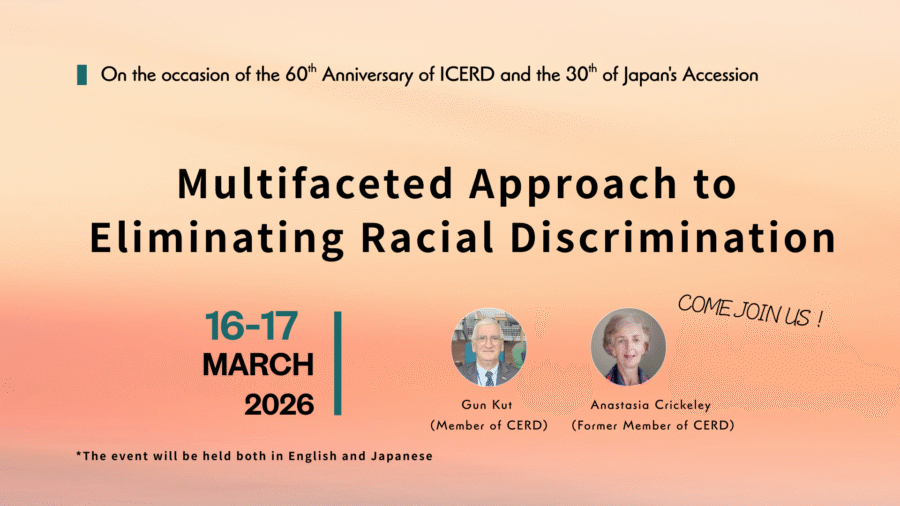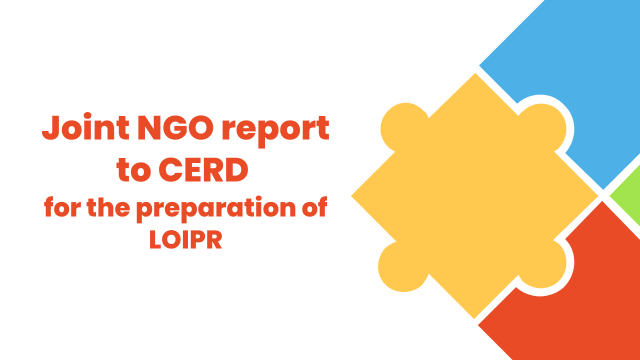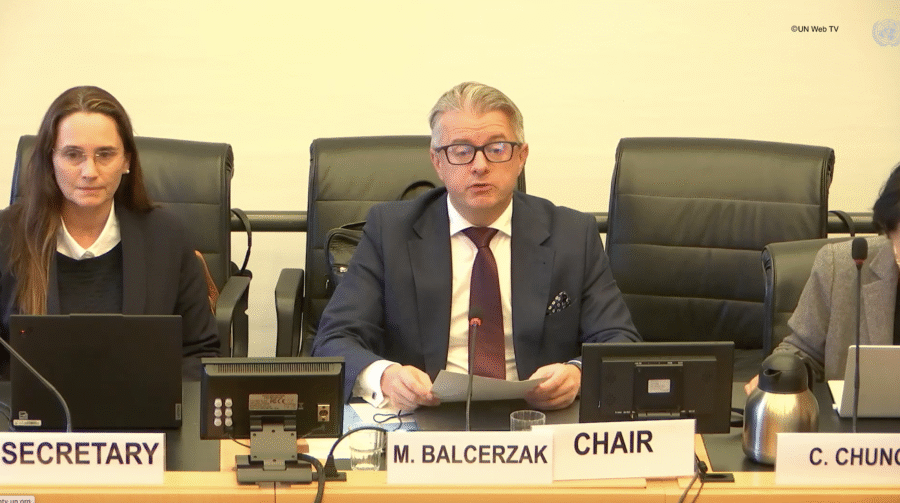Joint NGO letter – UN treaty bodies must continue to monitor States’ compliance with their human rights obligations during the COVID-19 crisis
May 11, 2020
Chairpersons of the Human Rights Treaty Bodies
Ms. Michelle Bachelet, United Nations High Commissioner for Human Rights
11 May 2020
RE: UN human rights treaty bodies during the COVID-19 pandemic
Dear Chairpersons of the Human Rights Treaty Bodies and High Commissioner Bachelet,
We, the undersigned non-governmental organisations, write to you concerning the functioning of the treaty body system during the COVID-19 pandemic. We express our appreciation for the Chairpersons’ joint statement on the COVID-19 pandemic issued on 24 March as well as the individual guidance issued by various Committees.[1] We echo that States’ responses to the crisis, including declarations of a state of emergency, must comply with international human rights standards. For this reason, it is essential that the United Nations human rights treaty bodies (UNTBs) continue to monitor States’ compliance with their treaty obligations during the crisis.
The suspension of all in-person sessions until June, with possible extension to also include the summer sessions, is hampering the work of the UNTBs, in particular their consideration of States parties’ reports. However, we believe important work can continue and encourage the UNTBs to undertake their mandated activities remotely where feasible. Promising practices recently undertaken by several UNTBs include: the decision by the Committee on Enforced Disappearances (CED) to hold its session online, during which it will adopt Lists of Issues (LOIs) for future reviews[2]; the anticipated adoption by the Committee against Torture (CAT) of Lists of Issues Prior to Reporting (LOIPRs) and LOIs remotely; the adoption of concluding observations remotely by the Human Rights Committee after the suspension of its March session[3]; the adoption of LOIs and LOIPRs by the Committee on the Rights of Persons with Disabilities[4] (CRPD) and the Human Rights Committee; and the online discussions held by the Working Group on the Optional Protocol on Communications (OPIC) of the Committee on the Rights of the Child (CRC) to analyse individual communications. We also understand that the Human Rights Committee is making arrangements to advance the internal discussions on the draft General Comment No. 37 remotely. We urge the UNTBs to consider these promising practices, and where relevant, replicate them across the treaty body system. We also urge the UNTBs to ensure safe and effective civil society involvement where this would have been a component of in-person sessions.
We welcome the decision of the UN Office of the High Commissioner for Human Rights (OHCHR) to extend all deadlines for observations or comments on all registered cases of individual complaints by two months and its commitment to continuing its work to handle petitions, especially interim measures and urgent actions[5]. However, the backlog of individual communications and the lack of sufficient resources had been identified as a significant challenge for the UNTBs prior to the COVID-19 pandemic.[6] Given that several treaty body sessions have been postponed, where possible, we urge the OHCHR to re-direct Secretariat resources not spent on postponed sessions to process the large backlog of petitions. In addition, we urge treaty body members to adopt views on petitions remotely.
We further urge Committees with urgent action procedures, in particular the Committee on the Elimination of Racial Discrimination (CERD) and the CRPD, to strengthen the procedures by swiftly responding to a risk of significant violations of their respective Conventions between sessions in order to reduce the protection gap.
We recognize that the need to find solutions must balance pragmatic approaches and existing rules of procedures, including by ensuring adequate communications technologies, interpretation services, accessibility requirements, as well as privacy and security for both treaty body members and those engaging with the UNTBs. The UNTBs and their Secretariats should be provided with the necessary resources to address such challenges as a matter of priority.
It will be detrimental for rights-holders if the UNTBs, who are the only independent and expert monitors of the legally binding human rights treaties, are not able to execute their mandates during the COVID-19 crisis. We therefore urge the UNTBs and the OHCHR to explore all possible options for ensuring maximum implementation capacity for the UNTBs during the crisis, and we look forward to supporting these efforts.
Similarly, we would like to urge the Chairpersons and OHCHR to take steps to ensure that key segments of the Annual Meeting of the Chairpersons of the UNTBs, are webcast, and that arrangements are made for virtual consultations with civil society organizations and representatives.
Sincerely,
SIGNATORIES:
ADC Memorial
African Centre for Treatment and Rehabilitation of Torture Victims
Amnesty International
Antigone (Italy)
Asociación Pro Derechos Humanos de España
ASSOCIATION TCHADIENNE POUR LA PROMOTION ET LA DEFENSE DES DROITS DE L’HOMME (ATPDH)
AUDF Alliance pour l’universalité des Droits Fondamentaux ONG /RDC
Center for Constitutional Rights
CHILD RIGHTS INTERNATIONAL NETWORK (CRIN)
CIVICUS: World Alliance for Citizen Participation
Coalition Burkinabé des Défenseurs des Droits Humains
Collectif des Associations Contre l’Impunité au Togo (C.A.C.I.T.)
Collectif des Organisations de Defense des Droits de l Homme et de la Democratie
Columbia Law School Human Rights Institute
Franciscans International
Geneva for Human Rights – Global Training (GHR)
Global Detention Project
International Commission of Jurists
International Rehabilitation Council for Torture Victims (IRCT)
International Service for Human Rights (ISHR)
Jacob Blaustein Institute for the Advancement of Human Rights (JBI)
Ligue Tchadienne des Droits de l’Homme
MENA Rights Group
Minority Rights Group International
Open Society Justice Initiative
Rencontre Africaine pour la Défense des Droits de l’Homme (RADDHO)
Réseau des Défenseurs des Droits Humains en Afrique Centrale (REDHAC)
Réseau International des Droits Humains RIDH
SANAD- OMCT Tunisie
Sexual Rights Initiative (SRI)
SOS Information Juridique Multisectorielle (SOS IJM)
TB-Net (NGO Network on UN Treaty Bodies, comprising: Centre for Civil and Political Rights (CCPR Centre); Child Rights Connect; Global Initiative for Economic, Social and Cultural Rights (GI-ESCR); International Disability Alliance (IDA); International Movement Against All Forms of Discrimination and Racism (IMADR); International Women’s Rights Watch Asia Pacific (IWRAW-AP); and World Organisation Against Torture (OMCT))
The Advocates for Human Rights
The Independent Medico-Legal Unit
The International Institute for Race, Equality and Human Rights (Race and Equality)
Women’s Link Worldwide
[1] https://www.ohchr.org/EN/NewsEvents/Pages/DisplayNews.aspx?NewsID=25742&LangID=E
[2] https://www.ohchr.org/EN/NewsEvents/Pages/DisplayNews.aspx?NewsID=25841
[3] https://www.ohchr.org/EN/NewsEvents/Pages/DisplayNews.aspx?NewsID=25766&LangID=E
[4] https://tbinternet.ohchr.org/_layouts/15/treatybodyexternal/SessionDetails1.aspx?SessionID=1377&Lang=en
[5] https://www.ohchr.org/Documents/HRBodies/ICA.pdf
[6] Paragraph 55, A/74/643





